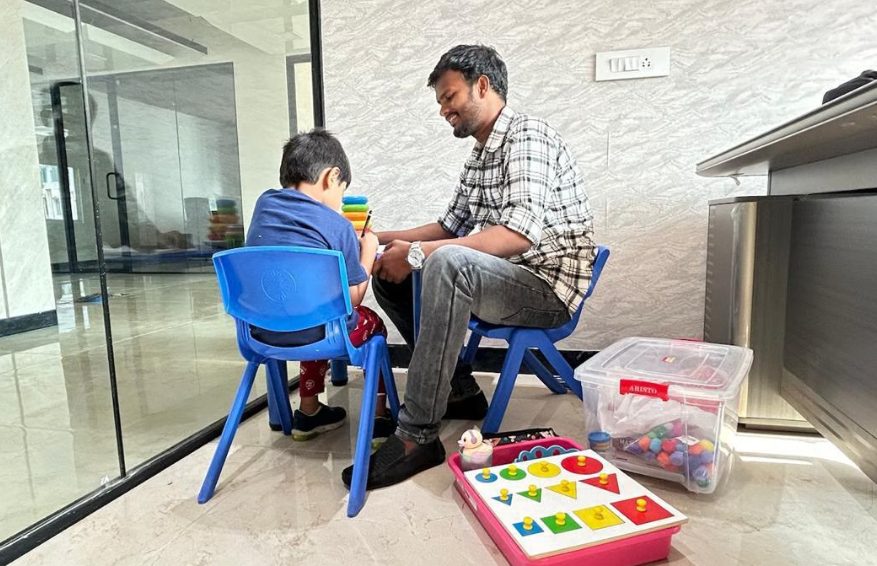
Think about this for a minute. Your child looks you in the eye for the first time during snack time, not because a prompt told them to, but because they wanted to share that moment with you. Your heart does a little flip! You glance at the data sheet nearby, and nowhere does it capture the absolute magic of that three-second connection.
While ABA therapy progress tracking through data collection remains the gold standard for measuring behavioral changes, some of the most profound victories happen in the spaces between those carefully plotted points. These are the moments that make parents cry happy tears in grocery store parking lots and frantically text family at 10 PM.
Let’s dive into these emotional wins that deserve their own standing ovation.
Understanding ABA Therapy: The Foundation of Progress
Before we explore those heart-swelling moments, let’s ground ourselves in understanding how does ABA therapy work. Applied Behavior Analysis uses evidence-based techniques rooted in behavioral science to teach new skills and reduce challenging behaviors. A BCBA (Board Certified Behavior Analyst) develops individualized treatment plans using strategies like positive reinforcement, rewarding desired behaviors to increase their occurrence.
ABA therapy benefits are well-documented. Research shows that intensive, long-term ABA therapy can lead to significant improvements in communication, social skills, and adaptive behaviors. In fact, studies indicate that children receiving 25-40 hours of autism ABA therapy per week show substantial gains across multiple developmental domains.
But here’s what the research papers sometimes miss: the pure joy on a child’s face when they finally master tying their shoes, or the pride in their voice when they use a new word unprompted.
Schedule a FREE consultation with our ASD experts now
The Emotional Milestones That Matter Most
The First Spontaneous “I Love You”
Data sheets track prompted versus unprompted communication. They note frequency, context, and generalization. But they can’t capture the moment your child walks up to you out of nowhere and says, “I love you, Mommy” for the very first time without any prompting.
That’s the stuff ABA therapy progress is really made of, not just the acquisition of language skills, but the desire to connect. Through positive and negative reinforcement ABA therapy techniques, children learn communication isn’t just about getting needs met; it’s about sharing feelings and building relationships.
One parent described it perfectly: “The graph showed she could label emotions. But the graph didn’t show the day she noticed I was sad and brought me her favorite stuffed animal. That’s when I knew we weren’t just teaching skills, we were nurturing empathy.”
The Breakthrough in Self-Confidence
ABA progress monitoring tracks task completion and accuracy rates. But what about tracking the way your child’s shoulders straighten when they accomplish something hard? Or how their smile reaches their eyes when they try something new without fear?
According to Behavior Analysis International, while ABA therapy focuses on observable behaviors, the emotional growth that accompanies skill acquisition profoundly impacts quality of life. Children who experience success through structured learning develop resilience, self-efficacy, and genuine confidence.
Early Autism Ventures (EAV) recognizes this critical connection. Our expert team doesn’t just focus on data, they celebrate each child’s growing sense of “I can do this!” They understand that behind every mastered skill is a child discovering their own capabilities.
The Joy of Friendship
Your child’s autism ABA therapy program might include goals for peer interaction, turn-taking, and social initiation. The data might show “80% success rate for greeting peers.”
But the data can’t show you the afternoon your child gets invited to a birthday party. Or the first playdate where laughter, real, genuine, belly laughter, fills your home.
Reports also say that social skills development through structured ABA therapy significantly improves children’s ability to form meaningful relationships. But any parent will tell you: the real victory isn’t in just the percentage, it’s in watching your child experience belonging.
(And let’s be honest: it’s also in finally having another parent’s number in your phone who understands why you’re celebrating that your kid shared a toy for five whole minutes. Community matters, folks!)
Sensory Victories and Daily Living Wins
The ABA therapy benefits at Early Autism Ventures extend far beyond traditional academic or social goals. Sensory integration progress rarely makes it onto formal graphs, but parents know these wins are game-changers.
The first successful haircut without tears? That’s worthy of fireworks. Trying a new food, even just one bite? Call the relatives. Tolerating the sound of the vacuum cleaner? You just reclaimed a clean house and your sanity.
These victories emerge from patient, consistent application of positive reinforcement strategies and desensitization protocols. At EAV, our therapists understand that “daily living skills” aren’t just about independence, they’re about dignity, comfort, and expanding your child’s world one sensory experience at a time.
The Parent Transformation Nobody Talks About
Here’s something unexpected: ABA therapy progress isn’t just about your child’s growth. Parents transform too.
You become a detective, noticing tiny changes nobody else would catch. You become a cheerleader, celebrating victories measured in seconds rather than hours. You become fluent in a new language of ABC data, functional behavior assessments, and replacement behaviors, and somehow, you start thinking it’s perfectly normal dinner conversation.
Research from the Journal of Autism and Developmental Disorders shows that parent involvement in ABA therapy correlates with better outcomes and increased family satisfaction. But statistics can’t measure how empowered you feel when you successfully implement a positive and negative reinforcement ABA therapy strategy that actually works. Or the relief of having a roadmap when challenging behaviors emerge.
EAV prioritizes parent training and collaboration because we know this truth: you’re not just caregivers, you’re essential team members. Our BCBA professionals work alongside families, ensuring that ABA therapy strategies generalize beyond sessions and into real life. When parents feel confident and supported, children thrive exponentially.
The Power of “Almost” and “Trying”
Traditional ABA progress monitoring focuses on mastery, and rightfully so. But somewhere between “baseline” and “target achieved” lives a beautiful space called “effort.”
Your child attempting something scary deserves recognition, even if they don’t succeed on the first (or fiftieth) try. How does ABA therapy work to acknowledge this? Through shaping and successive approximation, reinforcing closer and closer attempts toward the desired behavior.
But emotionally? Those attempts represent courage. They represent trust in you, in their therapist, in themselves. They represent a child saying, “This is hard, but I’m going to try anyway.”
That’s the kind of progress that keeps parents going on difficult days.
When Regression Reveals Resilience
Let’s keep it real: ABA therapy isn’t always a linear upward trajectory. There are plateaus. There are backslides. There are weeks when you wonder if you’re imagining the progress altogether.
But here’s what the graphs sometimes miss: watching your child recover from setbacks builds a different kind of strength. Learning that “bad days” don’t erase progress teaches everyone involved about resilience.
Studies confirm that children receiving consistent autism ABA therapy develop stronger coping mechanisms and adaptability. The ABA therapy benefits include not just skill acquisition, but emotional regulation and problem-solving abilities that serve children throughout life.
At EAV, we normalize the non-linear nature of development. Our team doesn’t just track regression, we help families understand it, navigate it, and emerge stronger. Because setbacks aren’t failures; they’re information.
Plus, EAV’s approach emphasizes celebrating all progress, not just the milestones that look impressive on paper. Our therapists understand that a child independently washing their hands might represent months of task analysis, modeling, and patient repetition. That deserves confetti, not just a data point.
While we’re passionate about rigorous ABA progress monitoring and evidence-based practices, EAV has built our entire philosophy around recognizing the complete child, their personality, their preferences, their emotional world, and their potential.
Our team brings both scientific expertise and genuine compassion to every session. We use proven positive and negative reinforcement ABA therapy techniques while never losing sight of what makes each child unique. We track data meticulously because it guides effective intervention, but we celebrate the unmeasurable moments with equal enthusiasm.
When you partner with EAV for ABA therapy, you’re not just getting research-backed intervention, you’re joining a community that understands the full spectrum of progress.
We provide:
– Individualized autism ABA therapy plans that respect your child’s interests and strengths
– Collaborative goal-setting that includes family priorities beyond traditional targets
– Parent coaching that empowers you to see and celebrate progress in all its forms
– Consistent communication about both data and those magical moments
– A team that genuinely loves what they do and whom they serve
The Bottom Line: Progress Wears Many Faces
The graphs, charts, and ABA progress monitoring data serve crucial purposes. They ensure accountability, guide treatment decisions, and demonstrate effectiveness. The documented ABA therapy benefits provide hope and direction for families beginning this journey.
But if you’re only looking at the data, you’re missing half the story.
The real magic of ABA therapy lives in the moments between measurements, in eye contact that lingers a beat longer, in laughter that bubbles up spontaneously, in the quiet confidence that builds session by session. It lives in your child’s growing belief that they can learn, grow, and connect with the world around them.
So yes, celebrate when those graphs show beautiful upward trends. Frame those progress reports. Share those target-achieved moments with everyone who helped you get there.
But also celebrate the victories that no data sheet can capture: the cuddle that lasted five seconds longer, the new interest that sparked curiosity, the moment your child surprised themselves with what they could do.
These are the ABA therapy progress milestones that change everything, not just for your child, but for your entire family.
So, don’t wait to give your child the comprehensive support they deserve. Contact Early Autism Ventures today to schedule a consultation with our compassionate BCBA team. Let’s create an individualized autism ABA therapy plan that honors your child’s potential and celebrates every kind of progress, measured and unmeasured alike.
Contact us now and discover why families trust us to see the whole child, not just the data points. Your child’s breakthrough moments are waiting, let’s discover them together.












Recent Comments